
by Pigeon Patrol | Jul 12, 2021 | Pigeon Predators, Pigeon Spikes, Pigeons, Pigeons in the News, Raccoons, Sparrows
All animals go through the circle of life, they are born (or hatched in the case of pigeons) live and die. But where do pigeons go to die? This article goes into it.
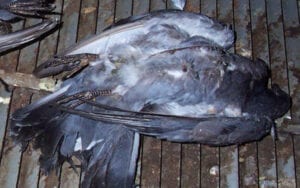
Pigeons look for dark secluded spaces to die. This includes holes, crevices, ventilation shafts and various building openings to spend their last moments. They do this to have peace away from predators in their last moments and they do this to not become a hindrance to the flock. They then die in peace in these spaces
At some point, everything comes to an end. It’s an inescapable fact of life. As humans, we have our final resting places, but what about birds? Considering how many pigeons are in existence one would assume that we would see more dead pigeons lying around, but we don’t. So, where do pigeons go to die?
Pigeons are one of the oldest domesticated and versatile birds of all times. They have been kept as pets, used as food, guides and otherwise. They are intelligent, they can recognize colours, measurements and have homing capabilities.
These animals are loyal, reliable and travel really fast, no wonder they’ve been messenger birds and travel guides. These birds are herbivores eating grains, vegetables, and fruits. They exist all around the world in large numbers and yet not many people have ever seen a dead pigeon.
Where do pigeons go to die?
These animals have a relatively short life span. They are also a tasty meal for any cats in the neighbourhood as well as predatory hawks. With so many pigeons dying often, how is that we never see dead pigeons everywhere? Do their feathered friends bury them or do they have someplace that they go before they reach bird haven?
Feral pigeons that live in cities look for dark covered spaces when they feel ill or are wounded. They’ve been this way for 1000s of years. They do this as a last-ditch attempt to recover in a safe space away from predators and not wanting to endanger the flock.
Pigeons will look for holes, crevices, ventilation shafts and various building openings to spend their last moments. Their small bodies decay very quickly after death. This explains why we don’t often see them dead and lying all over the place
Another reason why dead pigeon seems to disappear is to keep their dead bodies away from predators. These predators include cats, hawks, foxes, raccoons, and other opportunistic predators that will prey on weak and or dead and dying creatures. These predators are quick to attack so chances are before the sick pigeon can hit the ground they’ve been swooped up and snatched off as a meal.
How long do pigeons live?
How long pigeons live for is dependent on a couple of factors. While it is very unlikely for them to survive until old age in the wild, they may not do much better in captivity either. A pigeon in the wild can live up to 10 years.
The average number of years pigeons in cities live up to is 3 to 6 years. This is because they are easy prey, they get hit by passing cars, or fly into windows and mesh nettings around buildings which can be fatal for them.
Pet pigeons, on the other hand, can live between 9 to 15 years. This is if the pigeon is not being raised for food, they live this long if they are treated extremely well. Treating a pigeon well can be a job on its own, they need space, lots of open-air for flight, variety in their diet and can become sick if isolated from a flock.
What causes pigeons to die suddenly
Pigeons are susceptible to a wide range of diseases. Pigeons are zoonotic creatures, they can act as disease carriers. Often pigeons die because of these diseases. As pigeon age, their immune strength, agility, sensory and digestive systems decline, this causes them to die suddenly.
How do you know if pigeons are dying?
Sick or dying pigeons often isolate themselves, they remove themselves from the pack and go to dark shaded spaces. Their activity levels drop, and you hear them cooing less and less. In addition, their eating habits change for the worst and they don’t interact with the flock. Remember to be careful around these birds as they can carry and transmit a variety of diseases.
Do birds bury their dead
No, birds do not mourn or bury their dead flock members. You may have noticed birds “mourning” a dead member of their flock. The sounds that a dove or pigeon make can sound like mourning over their friend as they gather around it but this does not mean they are in mourning. Rather it means that they are trying to get some sort of response from the fallen bird to find out what happened and where the death-causing threat came from.
What if a pigeon dies in your house?
If a pet pigeon dies in your house, especially from old age or from an unknown cause, its best to hire professionals to get rid of the bird. If you decide to bury the bird make sure that you use disposable gloves for handling and seal bags for the disposing also burry the bird very deep in the ground.
Conclusion
Pigeons naturally look for dark crevices when they are sick and dying, this is so that they are out of sight when they die. These animals have a low life expectancy rates both in the wild and in cites if they aren’t taken care of. If a pigeon dies on your property it would be best to contact pest controls services to remove them
If you’re interested in pigeons you may also be interested in these articles: What do pigeons eat in the wild? When do pigeons leave the nest? What do pigeons like to eat? Where do pigeons go in the winter? Click the links to read more
Source
Pigeon Patrol Products & Services is the leading manufacturer and distributor of bird deterrent (control) products in Canada. Pigeon Patrol products have solved pest bird problems in industrial, commercial, and residential settings since 2000, by using safe and humane bird deterrents with only bird and animal friendly solutions. At Pigeon Patrol, we manufacture and offer a variety of bird deterrents, ranging from Ultra-flex Bird Spikes with UV protection, Bird Netting, 4-S Bird Gel and the best Ultrasonic and audible sound devices on the market today.
Voted Best Canadian wholesaler for Bird Deterrent products ten years in a row.
Contact us at 1- 877– 4– NO-BIRD, (604) 585-9279 or visit our website at www.pigeonpatrol.ca
Pigeon/Pigeon Patrol / Pigeons Roosting / Vancouver Pigeon Control /Bird Spikes / Bird Control / Bird Deterrent / Pigeon Deterrent? Surrey Pigeon Control / Pest /Seagull deterrent / Vancouver Pigeon Blog / Birds Inside Home / Pigeons in the cities / Ice Pigeons/ What to do about pigeons/ sparrows , Damage by Sparrows, How To Keep Raccoons Away, Why Are Raccoons Considered Pests/ De-fence / Pigeon Nesting/ Bird Droppings / Pigeon Dropping/ woodpecker control/ Professional Bird Control Company/ Keep The Birds Away/ Birds/rats/ seagull/pigeon/woodpecker/ dove/sparrow/pidgeon control/pidgeon problem/ pidgeon control/flying rats/ pigeon Problems/ bird netting/bird gel/bird spray/bird nails/ bird guard
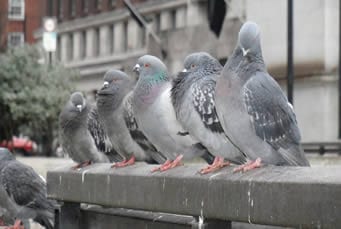
by Pigeon Patrol | Jul 12, 2021 | Bird Spike, history of pigeons, MBCA, pet bird, Pigeons, Pigeons in the News
Keeping this in view, how do pigeons survive in the city?
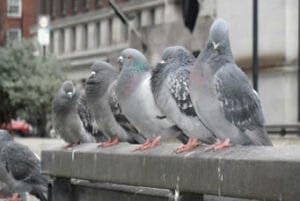
Pigeons (Rock Doves) adapt well to cities because they find there habitat similar to the cliffs where they live in the wild. If we were prepared to capture and eat them (not recommended today for health reasons) their populations would be much smaller of course.
Subsequently, question is, where do pigeons die? This background means that, when sick or injured, pigeons instinctively retreat to dark, remote places – ventilation systems, attics, building ledges – hoping to remain out of reach and unnoticed by predators. The predators don’t see them, but neither do we: often when pigeons expire, they are in hiding.
Keeping this in consideration, how long can a pigeon live?
Life Expectancy: Varies greatly from 3-5 years through to 15 years dependent on many factors, including natural predation and human interference. Predation: The wild pigeon is predated upon, almost exclusively, by the peregrine falcon, a bird that is also found living and breeding in coastal regions.
Do pigeons fight to the death?
As The Tom says, pigeons will defend their nest to the death under these circumstances. In a confined space this can quickly lead to the eggs becoming broken, or even the squabs being trampled to death in the ensuing skirmish.
Source
Pigeon Patrol Products & Services is the leading manufacturer and distributor of bird deterrent (control) products in Canada. Pigeon Patrol products have solved pest bird problems in industrial, commercial, and residential settings since 2000, by using safe and humane bird deterrents with only bird and animal friendly solutions. At Pigeon Patrol, we manufacture and offer a variety of bird deterrents, ranging from Ultra-flex Bird Spikes with UV protection, Bird Netting, 4-S Bird Gel and the best Ultrasonic and audible sound devices on the market today.
Voted Best Canadian wholesaler for Bird Deterrent products ten years in a row.
Contact us at 1- 877– 4– NO-BIRD, (604) 585-9279 or visit our website at www.pigeonpatrol.ca
Pigeon/Pigeon Patrol / Pigeons Roosting / Vancouver Pigeon Control /Bird Spikes / Bird Control / Bird Deterrent / Pigeon Deterrent? Surrey Pigeon Control / Pest /Seagull deterrent / Vancouver Pigeon Blog / Birds Inside Home / Pigeons in the cities / Ice Pigeons/ What to do about pigeons/ sparrows , Damage by Sparrows, How To Keep Raccoons Away, Why Are Raccoons Considered Pests/ De-fence / Pigeon Nesting/ Bird Droppings / Pigeon Dropping/ woodpecker control/ Professional Bird Control Company/ Keep The Birds Away/ Birds/rats/ seagull/pigeon/woodpecker/ dove/sparrow/pidgeon control/pidgeon problem/ pidgeon control/flying rats/ pigeon Problems/ bird netting/bird gel/bird spray/bird nails/ bird guard

by Pigeon Patrol | Jul 12, 2021 | Pigeon Spikes, Pigeons, Pigeons in the News, Raccoons, Sparrows, UltraSonic Bird Control
Canberra, Australia — A pigeon that Australia declared a biosecurity risk has received a reprieve after a U.S. bird organization declared its identifying leg band was fake.
The band suggested the bird found in a Melbourne backyard on Dec. 26 was a racing pigeon that had left Oregon, 8,000 miles away, two months earlier.
On that basis, Australian authorities on Thursday said they considered the bird a disease risk and planned to kill it.
But Deone Roberts, sport development manager for the Oklahoma-based American Racing Pigeon Union, said on Friday the band was fake.
The band number belongs to a blue bar pigeon in the United States and that is not the bird pictured in Australia, she said.
“The bird band in Australia is counterfeit and not traceable,” Roberts said. “It definitely has a home in Australia and not the U.S.”
“Somebody needs to look at that band and then understand that the bird is not from the U.S. They do not need to kill him,” she added.
Australia’s Agriculture Department, which is responsible for biosecurity, agreed that the pigeon dubbed Joe, after U.S. President-elect Joe Biden, was wearing a “fraudulent copy” leg band.
“Following an investigation, the department has concluded that Joe the Pigeon is highly likely to be Australian and does not present a biosecurity risk,” it said in a statement.
The department said it will take no further action.
Acting Australian Prime Minister Michael McCormack had earlier said there would be no mercy if the pigeon was from the United States.
“If Joe has come in a way that has not met our strict biosecurity measures, then bad luck Joe, either fly home or face the consequences,” McCormack said.
Martin Foley, health minister for Victoria state, where Joe is living, had called for the federal government to spare the bird even if it posed a disease risk.
“I would urge the Commonwealth’s quarantine officials to show a little bit of compassion,” Foley said.
Andy Meddick, a Victorian lawmaker for the minor Animal Justice Party, called for a “pigeon pardon for Joe.”
“Should the federal government allow Joe to live, I am happy to seek assurances that he is not a flight risk,” Meddick said.
Melbourne resident Kevin Celli-Bird, who found the emaciated bird in his backyard, was surprised by the change of nationality but pleased that the bird he named Joe would not be destroyed.
“I thought this is just a feel-good story and now you guys want to put this pigeon away and I thought it’s not on, you know, you can’t do that, there has got to be other options,” Celli-Bird said of the threat to euthanize.
Celli-Bird had contacted the American Racing Pigeon Union to find the bird’s owner based on the number on the leg band. The bands have both a number and a symbol, but Celli-Bird didn’t remember the symbol and said he can no longer catch the bird since it has recovered from its initial weakness.
The bird with the genuine leg band had disappeared from a 350-mile race in Oregon on Oct. 29, Crooked River Challenge owner Lucas Cramer said.
That bird did not have a racing record that would make it valuable enough to steal its identity, he said.
“That bird didn’t finish the race series, it didn’t make any money and so its worthless, really,” Cramer said.
Counterfeiting bird bands is “happening more and more,” Roberts said. “People coming into the hobby unknowingly buy that.”
Pigeon racing has seen a resurgence in popularity, and some birds have become quite valuable. A Chinese pigeon racing fan put down a record price of $1.9 million in November for a Belgian-bred pigeon.
Cramer said it was possible a pigeon could cross the Pacific on a ship from Oregon to Australia.
“In reality, it could potentially happen, but this isn’t the same pigeon. It’s not even a racing pigeon,” Cramer said.
The bird spends every day in the backyard, sometimes with a native dove on a pergola.
“I might have to change him to Aussie Joe, but he’s just the same pigeon,” Celli-Bird said.
Lars Scott, a carer at Pigeon Rescue Melbourne, a bird welfare group, said pigeons with American leg bans were not uncommon around the city. A number of Melbourne breeders bought them online and used them for their own record keeping, Scott said.
Australian quarantine authorities are notoriously strict. In 2015, the government threatened to euthanize two Yorkshire terriers, Pistol and Boo, after they were smuggled into the country by Hollywood star Johnny Depp and his now-ex-wife Amber Heard.
Faced with a 50-hour deadline to leave Australia, the dogs made it out in a chartered jet.
Source
Pigeon Patrol Products & Services is the leading manufacturer and distributor of bird deterrent (control) products in Canada. Pigeon Patrol products have solved pest bird problems in industrial, commercial, and residential settings since 2000, by using safe and humane bird deterrents with only bird and animal friendly solutions. At Pigeon Patrol, we manufacture and offer a variety of bird deterrents, ranging from Ultra-flex Bird Spikes with UV protection, Bird Netting, 4-S Bird Gel and the best Ultrasonic and audible sound devices on the market today.
Voted Best Canadian wholesaler for Bird Deterrent products ten years in a row.
Contact us at 1- 877– 4– NO-BIRD, (604) 585-9279 or visit our website at www.pigeonpatrol.ca
Pigeon/Pigeon Patrol / Pigeons Roosting / Vancouver Pigeon Control /Bird Spikes / Bird Control / Bird Deterrent / Pigeon Deterrent? Surrey Pigeon Control / Pest /Seagull deterrent / Vancouver Pigeon Blog / Birds Inside Home / Pigeons in the cities / Ice Pigeons/ What to do about pigeons/ sparrows , Damage by Sparrows, How To Keep Raccoons Away, Why Are Raccoons Considered Pests/ De-fence / Pigeon Nesting/ Bird Droppings / Pigeon Dropping/ woodpecker control/ Professional Bird Control Company/ Keep The Birds Away/ Birds/rats/ seagull/pigeon/woodpecker/ dove/sparrow/pidgeon control/pidgeon problem/ pidgeon control/flying rats/ pigeon Problems/ bird netting/bird gel/bird spray/bird nails/ bird guard
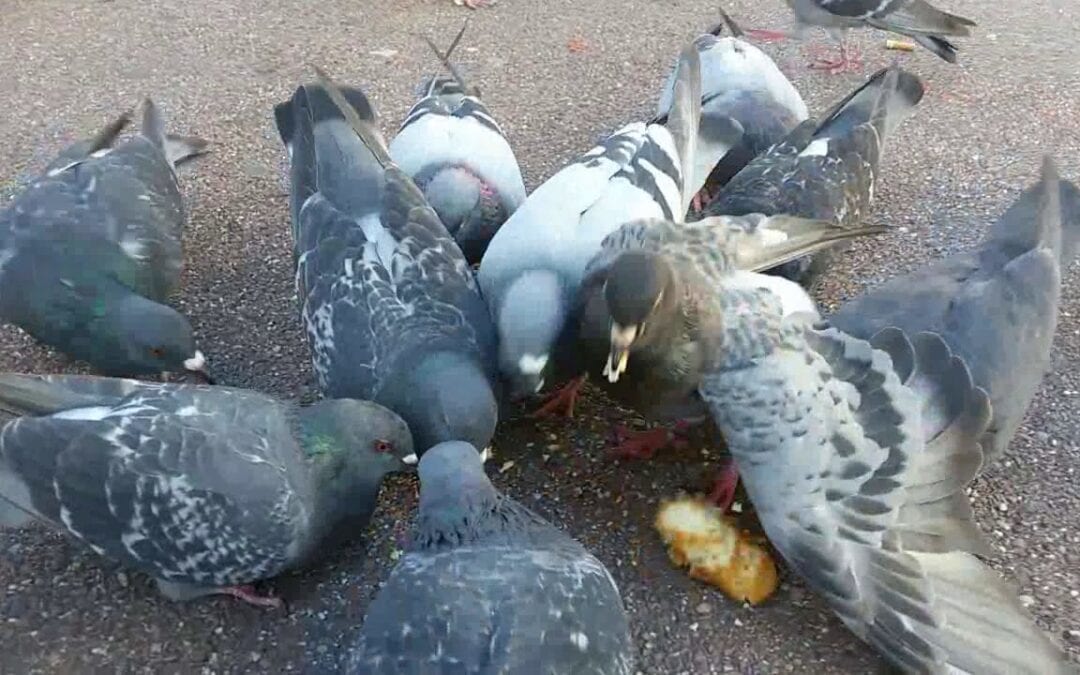
by Pigeon Patrol | Jul 5, 2021 | Pigeon Predators, Pigeon Spikes, Pigeons, Pigeons in the News, Raccoons, Sparrows, UltraSonic Bird Control
If you saw Mary Poppins as a child and remember hearing ‘Feed the birds, tuppins a bag’ you probably thought that feeding the pigeons was a rather altruistic activity. Think again. ‘Pigeons are degrading the city,’ says Florence’s Environmental Assessor, Claudio Del Lungo, who recently passed an ordinance prohibiting the feeding of street birds. Fines are 50 Euro for anyone who feeds pigeons in the plaza or ducks along the Arno. The ordinance was issued in response to complaints from citizens about the worsening pigeon problem. According to Del Lungo, they attract rodents and insects, deteriorate hygiene conditions and damage buildings and monuments.
As for the ducks, Del Lungo worries about their diet. He argues that people tend to overfeed ducks, perhaps killing them as a result. As is true for pigeons, food thrown into the Arno also attracts animals that will only cause the river to become dirty and pest-ridden.
This ordinance will be adopted by other cities in Italy as well. The objective is to cut costs related to sterilization, which is often ineffective. There are, however, four exceptions to the newly passed ordinance. They are: feeding grain to wild birds in agricultural areas; in private areas using bird feeders; under community administration; or while the birds are being monitored with ASL staff or other sanitary personnel—but never, ever in the piazza.
Source
Pigeon Patrol Products & Services is the leading manufacturer and distributor of bird deterrent (control) products in Canada. Pigeon Patrol products have solved pest bird problems in industrial, commercial, and residential settings since 2000, by using safe and humane bird deterrents with only bird and animal friendly solutions. At Pigeon Patrol, we manufacture and offer a variety of bird deterrents, ranging from Ultra-flex Bird Spikes with UV protection, Bird Netting, 4-S Bird Gel and the best Ultrasonic and audible sound devices on the market today.
Voted Best Canadian wholesaler for Bird Deterrent products ten years in a row.
Contact us at 1- 877– 4– NO-BIRD, (604) 585-9279 or visit our website at www.pigeonpatrol.ca
Pigeon/Pigeon Patrol / Pigeons Roosting / Vancouver Pigeon Control /Bird Spikes / Bird Control / Bird Deterrent / Pigeon Deterrent? Surrey Pigeon Control / Pest /Seagull deterrent / Vancouver Pigeon Blog / Birds Inside Home / Pigeons in the cities / Ice Pigeons/ What to do about pigeons/ sparrows , Damage by Sparrows, How To Keep Raccoons Away, Why Are Raccoons Considered Pests/ De-fence / Pigeon Nesting/ Bird Droppings / Pigeon Dropping/ woodpecker control/ Professional Bird Control Company/ Keep The Birds Away/ Birds/rats/ seagull/pigeon/woodpecker/ dove/sparrow/pidgeon control/pidgeon problem/ pidgeon control/flying rats/ pigeon Problems/ bird netting/bird gel/bird spray/bird nails/ bird guard
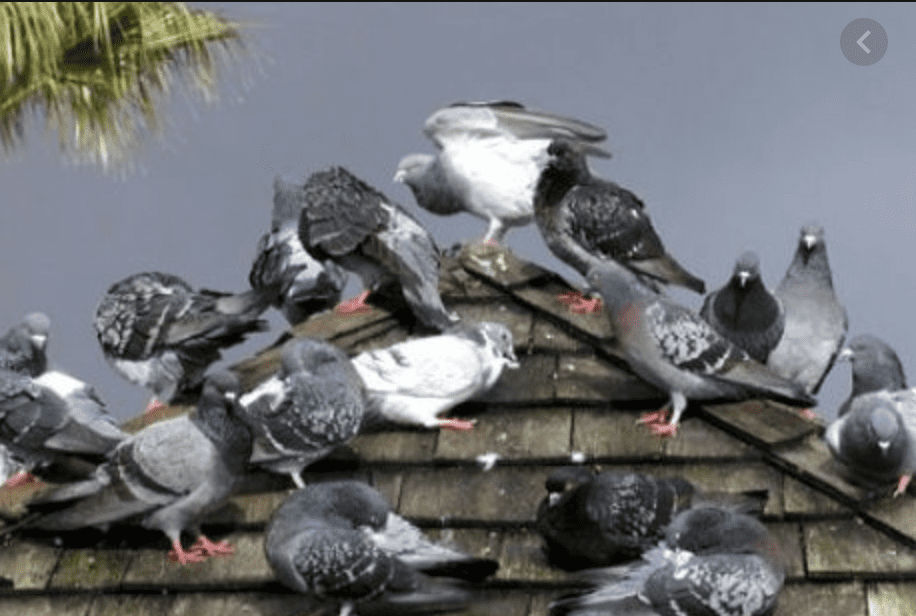
by Pigeon Patrol | Jun 28, 2021 | Pigeon Patrol's Services, Pigeon Predators, Pigeons, Pigeons in the News, Raccoons, Sparrows, UltraSonic Bird Control
Pigeons have been living alongside humans for thousands of years, and have adapted their lifestyle to urban living very successfully. In their natural habitat, they would nest on the sides of tall rocky cliffs. Balconies and ledges on apartment buildings are very similar, so pigeons often choose to nest in these familiar places.
What to do if pigeons are nesting on the balcony
Be patient with a family of pigeons
If the babies have already hatched, really the only thing you can do is wait for them to grow up and fly away. Don’t worry — baby pigeons grow up very quickly! The time between when they hatch from the egg to when they fly away from their nest is usually less than 4 weeks. Once they leave, the babies don’t come back to the nest again.
The parents may try to start another nest in the same spot, even before the first babies have grown up and flown off. Read on to find out how to keep them from nesting on your balcony in the future.
Can’t I just move the nest?
No. Pigeons are very location-specific when it comes to their nest site. Moving the nest over even a few feet — say to a neighbouring balcony — can cause the parents to abandon the nest.
Baby pigeons NEED their parents — they cannot survive without them. Their parents feed them, keep them warm, and even after they’ve left the nest mom and dad show them how to fly, escape from predators, and integrate with the flock.
If you take the babies off of your balcony and move them, even if it’s to a “nice” spot like the local park, they will die. The best thing to do is to let the parents raise this one set of babies. It will take less than a month, they grow up so fast. Once the babies have flown away, you can prevent the pigeons from nesting again in the future.
Keep things tidy
Clean up or put away any things you might be storing on your balcony that are providing shelter or hiding spots for the pigeons to nest. Sweep away any feces or nesting material. It’s fine to do this cleaning while the babies are still on the balcony, just stay away from the exact spot the nest is in.
Remember, the parent pigeons may lay a new set of eggs before the first babies are grown up and gone. You will have to be diligent and go outside every day to sweep away any fresh nesting material. Eventually, the pigeons will get the message that your balcony is not a good place to nest, and they’ll go elsewhere.
What if they lay another set of eggs?
If they do lay a new set of eggs, provided you know that they were laid less than a week ago, it’s fine to dispose of them. We recommend taking them to the local park and hiding them under a bush – that way they can go back to being a part of nature.
If there is a new set of eggs and you’re not sure when they were laid, or you know they’re over two weeks old, we recommend leaving them be and letting the parents raise that brood. Pigeons usually incubate their eggs for about 3 weeks, and then the babies take about 4 weeks to grow up after hatching.
How to keep pigeons from nesting in the future
There are a few different things you can try to make your balcony less attractive to pigeons looking for a place to nest. Remember to wait until AFTER the babies have grown up and flown away before implementing any of these measures. You don’t want to separate the babies from their parents – they will die without their mom and dad.
Keep things tidy
Keeping things tidy and uncluttered is the first step. Pigeons like to choose a sheltered nest spot, so they like furniture and storage items to hide behind. Going out every day and sweeping off any new nesting material is the best thing you can do to prevent pigeon nests. Even just your presence out on the balcony will be enough to discourage many pigeons from nesting. We usually find that nests are made when no one is using the balcony, either early in the season or when the occupants have been out of town for a while.
Keep pigeons from perching
Adult pigeons like to perch on the railing of their nest-site balcony, so they can look around and spot any nearby predators. If you make it impossible to perch on the railing, they’ll usually find somewhere else to go.
We recommend a single length of wire or heavy gauge fishing line. Secure the line tautly about 2-3 inches above and parallel to the balcony railing. Tying it to nails or screws at either end can work. Pigeons aren’t technically perching birds, so it’s hard for them to stand on a piece of wire so thin. They won’t want to build their nest on a balcony where they can’t look out for predators.
Commercial flexible pigeon coils and wires can also work, but will be more expensive to install. We never recommend the use of sticky deterrents, because they can harm both pigeons and other species of birds.
Scare the pigeons away from the balcony
The best thing to scare pigeons away from a balcony is frequent human presence. We usually find that nests are made when no one is using the balcony, either early in the season or when the occupants have been out of town for a while.
You can also use visual deterrents to keep pigeons away from your balcony. Strips of shiny wrapping paper blowing in the breeze, old CDs hanging from string, and colourful spinning pinwheels are some cheap and easy options. Any visual deterrent will be more effective if you move it around or change it up regularly.
And no, those plastic owls don’t really work. At least not for pigeons.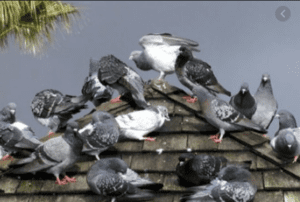
Be careful with pigeon netting
Completely netting in a balcony or ledge can be a very effective way of keeping pigeons from nesting or roosting in that spot. However, pigeon netting MUST be professionally installed and regularly maintained! When pigeon netting gets loose and floppy, it becomes a danger to pigeons, hawks, sparrows, and any other birds that might fly into it and get tangled up.
It is also important to wait until any active nests are finished and all babies have flown away before installing pigeon netting. If the babies are separated from their parents, they will die.
Source
Pigeon Patrol Products & Services is the leading manufacturer and distributor of bird deterrent (control) products in Canada. Pigeon Patrol products have solved pest bird problems in industrial, commercial, and residential settings since 2000, by using safe and humane bird deterrents with only bird and animal friendly solutions. At Pigeon Patrol, we manufacture and offer a variety of bird deterrents, ranging from Ultra-flex Bird Spikes with UV protection, Bird Netting, 4-S Bird Gel and the best Ultrasonic and audible sound devices on the market today.
Voted Best Canadian wholesaler for Bird Deterrent products ten years in a row.
Contact us at 1- 877– 4– NO-BIRD, (604) 585-9279 or visit our website at www.pigeonpatrol.ca
Pigeon/Pigeon Patrol / Pigeons Roosting / Vancouver Pigeon Control /Bird Spikes / Bird Control / Bird Deterrent / Pigeon Deterrent? Surrey Pigeon Control / Pest /Seagull deterrent / Vancouver Pigeon Blog / Birds Inside Home / Pigeons in the cities / Ice Pigeons/ What to do about pigeons/ sparrows , Damage by Sparrows, How To Keep Raccoons Away, Why Are Raccoons Considered Pests/ De-fence / Pigeon Nesting/ Bird Droppings / Pigeon Dropping/ woodpecker control/ Professional Bird Control Company/ Keep The Birds Away/ Birds/rats/ seagull/pigeon/woodpecker/ dove/sparrow/pidgeon control/pidgeon problem/ pidgeon control/flying rats/ pigeon Problems/ bird netting/bird gel/bird spray/bird nails/ bird guard
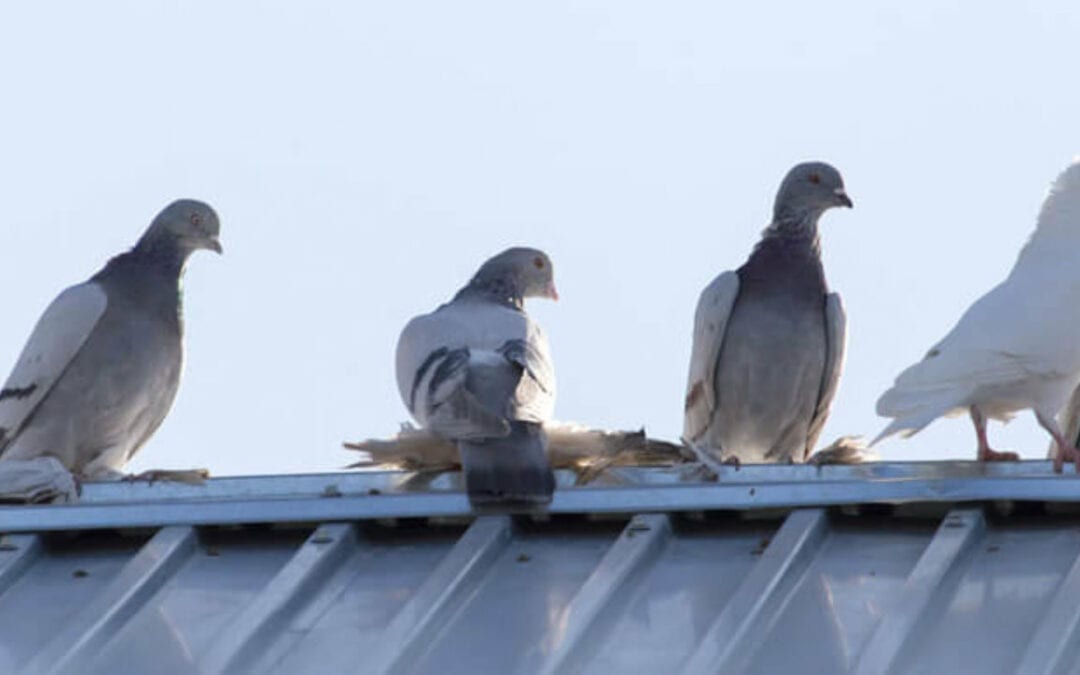
by Pigeon Patrol | Jun 28, 2021 | Pigeon Patrol's Services, Pigeon Predators, Pigeon Spikes, Pigeons, Pigeons in the News
Birds do not have teeth. Without teeth, a bird cannot chew its food down to bits in its mouth like humans do. As detailed in the textbook Ornithology by Frank B. Gill, birds must instead rely on the muscular stomach-like pouch called the gizzard to crush down their food. Many species swallow stones and grit to aid in digestion. These stones remain in the gizzard and crush the food as the gizzard contracts. From a functional perspective, gizzard stones in birds are the equivalent of teeth in humans. When a gizzard stone becomes too smooth to do its job, the bird regurgitates the stone or passes the stone down and out through its digestive tract. Species that do not swallow stones are able to use the sheer muscle power of their gizzards to grind down their food. Birds do not have teeth because the teeth and the jaw bone to support them are too heavy for efficient flight. Many birds have a series of notches in their beak or spikes on the inside of their beak or tongue. These notches and spikes are not true teeth as they are not used to crush down their food. Instead, these features are used to get a good grip on the prey so that it does not escape. In ancient evolutionary history, there were birds with true teeth. Known as odontornithes, these animals are no longer alive today.
Source
Pigeon Patrol Products & Services is the leading manufacturer and distributor of bird deterrent (control) products in Canada. Pigeon Patrol products have solved pest bird problems in industrial, commercial, and residential settings since 2000, by using safe and humane bird deterrents with only bird and animal friendly solutions. At Pigeon Patrol, we manufacture and offer a variety of bird deterrents, ranging from Ultra-flex Bird Spikes with UV protection, Bird Netting, 4-S Bird Gel and the best Ultrasonic and audible sound devices on the market today.
Voted Best Canadian wholesaler for Bird Deterrent products ten years in a row.
Contact us at 1- 877– 4– NO-BIRD, (604) 585-9279 or visit our website at www.pigeonpatrol.ca
Pigeon/Pigeon Patrol / Pigeons Roosting / Vancouver Pigeon Control /Bird Spikes / Bird Control / Bird Deterrent / Pigeon Deterrent? Surrey Pigeon Control / Pest /Seagull deterrent / Vancouver Pigeon Blog / Birds Inside Home / Pigeons in the cities / Ice Pigeons/ What to do about pigeons/ sparrows , Damage by Sparrows, How To Keep Raccoons Away, Why Are Raccoons Considered Pests/ De-fence / Pigeon Nesting/ Bird Droppings / Pigeon Dropping/ woodpecker control/ Professional Bird Control Company/ Keep The Birds Away/ Birds/rats/ seagull/pigeon/woodpecker/ dove/sparrow/pidgeon control/pidgeon problem/ pidgeon control/flying rats/ pigeon Problems/ bird netting/bird gel/bird spray/bird nails/ bird guard










